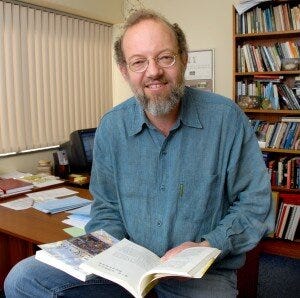2. Why the title 'Steps To A Humanity Of Organisation'?
A tribute, a necessity, a surprisingly powerful idea
You may well have noticed that I’ve called this Substack ‘Steps To A Humanity Of Organisation’. To get us underway it’s worth digging into this title. Why did I choose it? What does it have to tell us?
Gregory Bateson
Firstly, it’s a tribute to a great hero of mine, Gregory Bateson ( 1904-1980). An innovative thinker who crossed six imaginary boundaries before breakfast, Bateson has been characterised variously as an anthropologist, a semiotician, a cyberneticist, a founder of systems thinking, a philosopher, a logician, a psychiatrist (sort of*)1, an author and a maverick. An Englishman who mostly worked in the USA, Bateson ended up transforming most every field he came across, and was the key founder of the brief therapy tradition in which I have worked these past thirty years.
Bateson’s collection of short articles was published in 1972 under the title Steps To An Ecology Of Mind. It’s an endlessly fascinating and distracting classic, hard to read, going this way and that. Lots of us have it on our bookshelves and far fewer have tangled with it. It’s hard going. But the title has a lot to tell us. First of all, the end goal of it all is an ‘ecology of mind’. This somewhat obscure term points us to Bateson’s desire to explore ‘mind’ in relation to many levels of order and organisation within living systems, very far removed from conventional view of ‘in the head’ or ‘in the brain’.
Bateson tackles this question from many places. If you’d like an accessible flavour, his younger daughter Nora Bateson (a great colleague and friend, full disclosure) made a one-hour movie about him and his work in 2010. It’s called An Ecology Of Mind, it’s thoroughly excellent, and you can watch the trailer and even rent or buy it here. One great benefit of watching the movie is that Bateson-the-speaker is far more engaging, accessible, funny and mischievous than Bateson-the-writer. Bateson was adept at working with very large and very small ideas - an enthusiasm I share and to which I will return in later pieces here.
Steps To…
The other thing in the title (which I have obviously echoed here in my Substack) is the phrase ‘Steps To…’. It seems to me that Bateson recognised that the final arrival at a definitive ‘Ecology Of Mind’ was impossible. The most we can do it take steps in that direction. The direction itself is worthwhile, not the (endlessly put off) arrival at the destination.
I had a similar discussion with complexity philsopher Paul Cilliers when we met in Utrecht in 2008. We discussed the connections between Solution Focused practice and complexity theory and philosophy for a whole day. The most dramatic revelation for me was the idea of a ‘call from beyond the horizon’, coming from the work of French deconstructionist philosopher Jacques Derrida - something that can never be attained but nonetheless serves a purpose here and now by helping to clarify what is going on and connecting it to a direction. From my write-up of the meeting:
One example from Derrida would be ‘justice’. Paul told us how Derrida had often infuriated people by saying that ‘there can be no justice!’. Often misunderstood, this does not mean that we cannot act more or less justly, but that a perfect notion of justice is impossible. To know what is a just act in a complex system is impossible – something may seem just now, but tomorrow who knows... The notion is justice is a ‘quasi-transcendental concept’. However, the idea serves as a ‘call from beyond the horizon’, to help us talk about acting justly now, which has to be reinvented in specific conditions and will always be imperfect.

Another useful thought about the role of the horizon comes from Maya Angelou in her wonderful poem On The Pulse Of Morning:
“The horizon leans forward, offering space to place new steps of change.”
So while the horizon is unreachable, it is also a key source of direction, possibility and hope. I used this idea in a practical way in the Users Guide To The Future model - more on that another day.
The idea of a Humanity Of Organisation is, very similar. Is there a perfect and ultimate ideal way of organising humanely? No. Is it nonetheless worthwhile thinking about steps in that direction? Yes, absolutely.
The power of small steps
Those of you who are at all familiar with my work will know the store I set up helping people towards small steps. I usually contrast it with Big Plans, which are expensive, time-consuming to construct, open to collapse at any moment, and may take years to prove worthwhile. Small steps, on the other hand, are usually cheap, quick to carry out, give almost instant feedback and are not carried out to succeed but to learn. If they seem to be working, do more of them. If they’re not working, have another think - and include what you know now that you didn’t before.
Sometimes people ask me about whether their Big Problem can be ‘solved’ with a small step. The answer is not ‘solved’ - but a useful small step starts to give signs of progress (in the desired direction), gives new information to build on, promotes a sense of agency (“maybe we CAN do this”) and feelings more of excitement and possibility than anxiety and helplessness. Pretty good value, I think.
Isn’t this just Kaizen then? No. Kaizen is about improving things with small steps in a known and identified direction - it’s very useful. Solution Focus, as I see it, is about taking small steps in newly coherent directions.
When these steps (or other emerging steps) are taken in this new direction, the impact is much more mould-breaking – a confirmation that progress is not only possible but within reach. Once signs of progress are visible, those concerned can be confident that they are somewhere on the right track and can use all kinds of methods (including Kaizen) to build on it. Perhaps this is why so much SF work is ‘brief’ – once there is direction (which is shared) and momentum (movement in that direction), then the issue becomes one of continuing and building progress which folk can mostly carry out without outside help.
As a ‘recovering’ physicist, I enjoy asking people what’s the bigger difference – a small step vs a large step, or no step at all vs a small step? Mathematically, anyway, (and also in my experience), the second of these (replacing no step with a small step) is hugely bigger. The stuckness, hopelessness and uncertainly are replaced with hope and energy – and some small steps. Which is a very large step indeed.
Steps To A Humanity Of Organisation
So what I will be seeking to do here is not to create a recipe for a humane way of organising (for there can be no such thing, as we have seen), but to share and explore possible steps in that direction. Some of them may be immediately do-able in practice, others may be more discursive. I have some ideas about what might form - but who knows? The crux of complexity is that the unexpected will happen.
And it also depends on YOUR contributions, comments and engagement. I have already one one request for a topic (coming in a few weeks). What would you like to hear about? Comment below or email me at mark@sfwork.com.
We have nearly 100 subscribers already to Steps To A Humanity Of Organisation, after less than a week! That’s a wonderful response, and thank you for reading and subscribing. Please share this writing with your colleagues and anyone who may be interested.
(Sort of*) is also the subtitle of the wonderful stage presentation Pride And Prejudice (Sort Of*) written by Isobel Macarthur and currently on tour in the UK. It’s a retelling (and singing) of Jane Austen’s famous novel by five cleaning maids in one of her grand country houses; both ‘accurate’ and hilariously off-kilter, a triumph of multi-levelled narrative and framing. See it if you possibly can. And no, you don’t need to be familiar with the original to enjoy it.








Your Small Step approach really resonate to me and reminds me the Liberating Structures 15% Solutions which Is very powerful in my experience.
Love also the distinction with Kaizen, really insightful.